Hey there! Ricardo here. If you’re reading this, you’re probably aware that generative AI and AI-driven search engines are fundamentally reshaping how search works. By 2025, AI overviews are expected to dominate up to 90% of search engine visibility for competitive queries. That’s huge!
After months of testing, analyzing, and strategizing, I’ve cracked the code on how to rank in Google AI overviews effectively. Today, I’ll break it all down for you, step by step. I’ll even share a case study of how I got a client ranking for “PA solar incentives 2025” in just two days — not just on Google but also on platforms like ChatGPT and Perplexity. Let’s dive in!
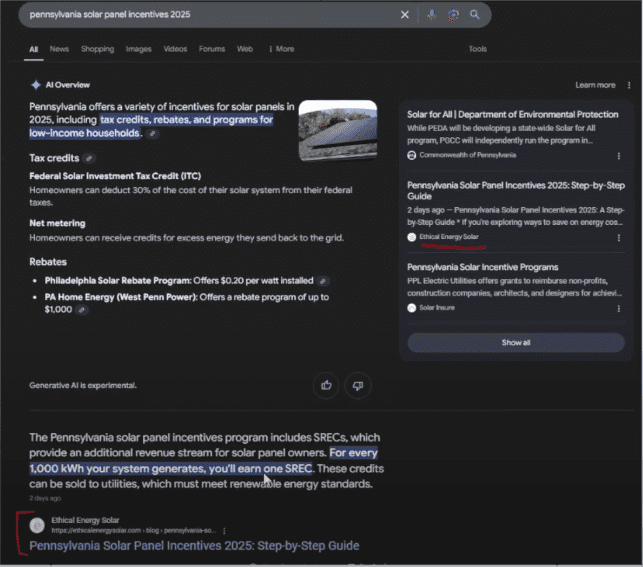
Why AI Overviews Are the Future of Search (And Why You Should Care)
AI overviews aren’t just another feature—they’re a seismic shift in how Google delivers search results. Unlike traditional search engines, which list 10 blue links, Google’s AI Overviews compile answers directly from top sources, displaying them in a single overviews panel. This means:
- AI Overviews Dominate Visibility: These summaries often occupy the majority of the search results page, leaving little room for organic links. For competitive keywords, appearing in these summaries can result in up to 90% of the clicks for that query.
- The New Era of Generative Engines: Generative engines like ChatGPT, Perplexity, and Copilot are increasingly pulling data from sources like Google and Bing. If your content isn’t optimized for these platforms, you’re missing out on a growing slice of traffic.
- Future-Proofing Your SEO: AI-driven search results are here to stay. Optimizing for AI overviews ensures you’re ahead of the curve while your competitors play catch-up.
But here’s the kicker: generative AI tools like ChatGPT, perplexity, and Copilot are also pulling from search engines like Bing. To stay ahead, you need to optimize for both Google’s AI and other search engines. Let me show you how.
How To Rank For Google AI Overviews
Step 1: Target Keywords That Trigger AI Overviews
Most SEO strategies focus on broad keywords, but AI overviews thrive on long-tail, user queries with clear search intent. Here’s how I found goldmine keywords for my client:
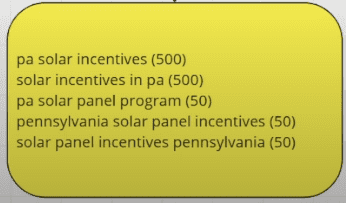
Reverse-Engineer Competitors in AI Overviews
I used Google Search Console to analyze which specific queries triggered AI overviews for competitors. For “PA solar incentives,” I noticed gaps:
- No one covered 2025 updates.
- Informational queries like “How do PA solar rebates work?” lacked concise answers.
Prioritize Long-Tail + Local Keywords
AI overviews favor user questions like:
- “What solar incentives are available in Pennsylvania in 2025?”
- “How to apply for PA solar tax credits.”
Tools like Ahrefs and SEMrush helped me pinpoint target keywords with search volume and low competition. Pro tip: Use Google Analytics to track user intent trends.
Validate with Schema Markup
I added FAQ schema markup to the client’s page, answering user questions like “Is net metering worth it?” This helped Google understand the content’s relevance for AI overviews.
Step 2: Structure Content for AI (and Humans)
Google’s AI prioritizes clear headings, bullet points, and short paragraphs. Here’s the blueprint I used:
Answer the Query in the First 100 Words
For “PA Solar Incentives 2025,” the H1 was:
“Pennsylvania’s 2025 Solar Incentives: Updated Programs, Tax Credits, and How to Apply”
Then, I answered the question immediately:
“In 2025, Pennsylvania residents can access federal tax credits covering 30% of solar installation costs, state rebates up to $1,000, and net metering benefits. Here’s how to qualify…”
Break Content into Scannable Sections
- H2: “2025 Federal Solar Tax Credits” (with bullet points on eligibility).
- H2: “PA-Specific Rebates and Grants” (linking to local business results).
- H2: “Net Metering in 2025” (using internal links to a detailed guide).
Leverage Structured Data
I added schema markup for:
- Article schema (to highlight authorship).
- LocalBusiness schema (since the client operated in PA).
This boosted search generative experience visibility in tools like perplexity.
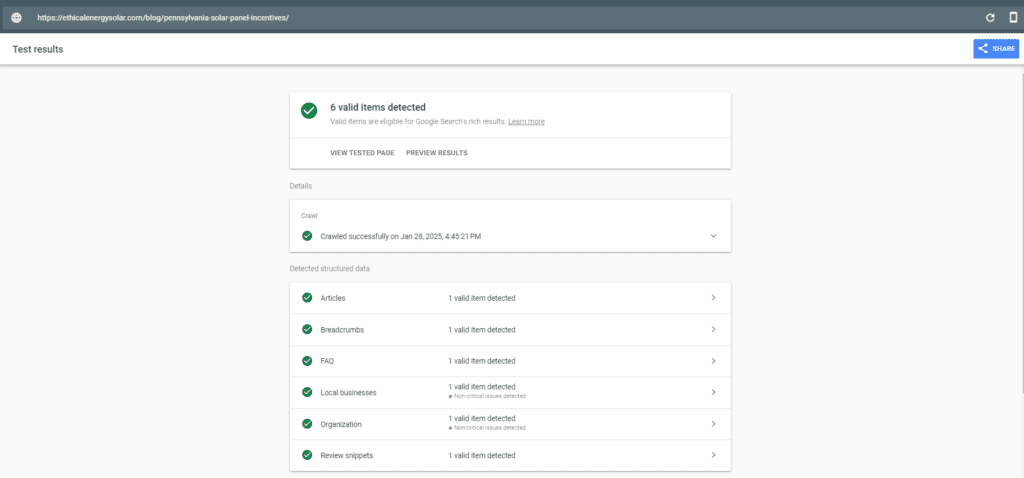
Step 3: Technical SEO: The Backbone of AI Rankings
AI overviews demand flawless technical SEO. Here’s what moved the needle:
Page Speed Optimization
The client’s page loaded in 1.2 seconds after:
- Compressing images with WebP.
- Removing render-blocking JavaScript.
Google prioritizes fast pages for AI-driven search results.
Mobile Optimization
I redesigned the layout for mobile-first indexing, ensuring short paragraphs and responsive tables.
Fix Crawl Errors with Search Console
A requesting re-indexing of the page after updates helped Google quickly recognize changes.
Step 4: Build Authority with Backlinks
Generative AI tools like ChatGPT weigh inbound links heavily. For the client:
- I earned sponsored tags from energy.gov referencing their guide.
- Guest posts on solar forums included structured data-rich anchors like “2025 PA Solar Incentives.”
Result? The page became a top source for AI-generated summaries on Bing and Google.
Results: Dominating AI Overviews in Two Days
The outcome? My client’s page quickly became a top resource for “PA solar incentives 2025” across:
Google AI Overviews: Secured the featured snippet and overview panel.
ChatGPT and Perplexity: Ranked as a primary source for generative queries.
Organic Rankings: Dominated the top three spots for related keywords.
This multi-platform visibility not only increased traffic but also established the client as an authority in the solar energy space.

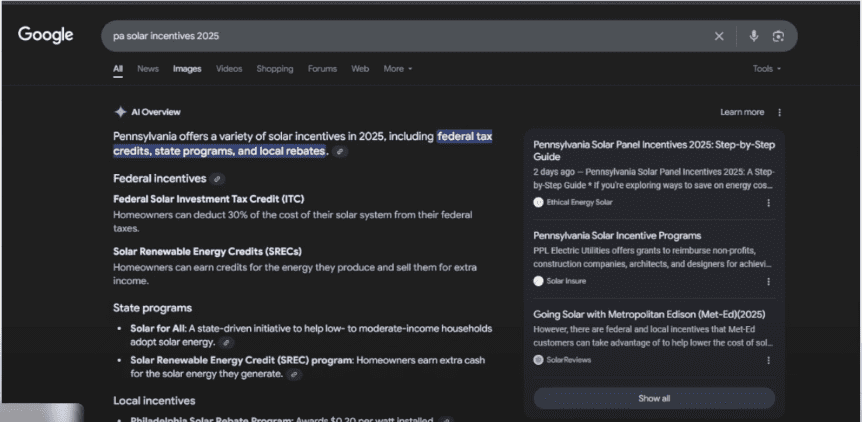
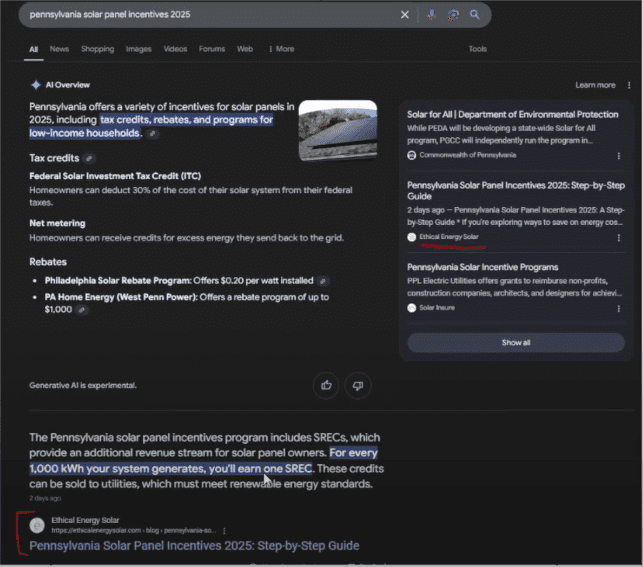
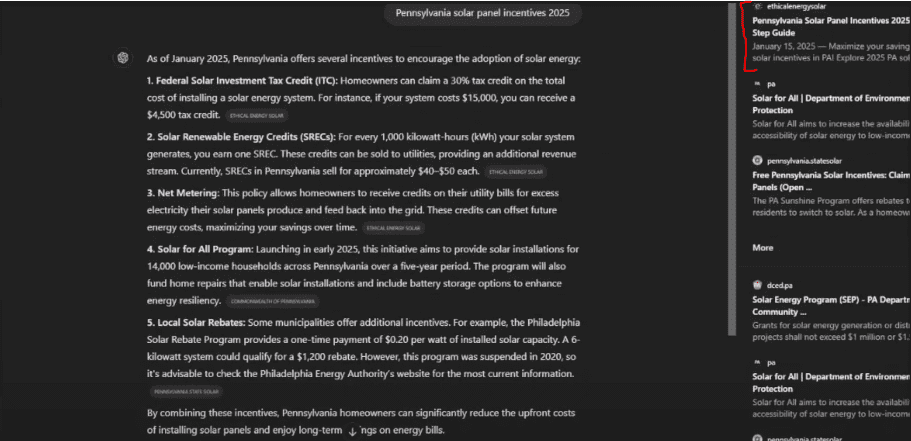
Final Thoughts
Ranking in Google’s AI Overviews isn’t luck—it’s strategy. By mastering search intent, structured data, and technical SEO, you’ll own the overviews panel while competitors cling to traditional search.
Ready to dominate? Book a free 30-minute consultation call with the best freelance SEO consultant and Let’s get you ranking!
Frequently Asked Questions On Google’s AI Overviews
What Is AI Overviews?
AI overviews are summaries generated by artificial intelligence to provide quick, concise answers or insights about a topic. They analyze and process vast amounts of data to highlight the most relevant information, making it easier for users to understand complex subjects or find answers efficiently. These overviews are commonly used in search results, virtual assistants, and content recommendations.
Can we rank AI content on Google?
Yes, AI-generated content can rank on Google as long as it adheres to Google’s quality guidelines. Google does not specifically penalize content purely for being AI-generated. Instead, their focus is on the value and usefulness the content provides to users. High-quality, original, relevant, and well-crafted content—whether created by humans or AI—has the potential to rank.
Is Google AI overview accurate?
Google’s AI overview is generally accurate and reliable, as it leverages advanced algorithms and vast datasets to process information. It is designed to provide relevant and informative insights. However, like any AI system, it may occasionally present outdated or incomplete information. Users should verify critical details with additional trusted sources when needed.
How to optimize for AI overviews?
To optimize for AI-generated overviews, focus on creating clear, structured, and relevant content. Use concise headings, bullet points, and well-defined sections to make key information easy to extract. Prioritize answering common user questions directly and ensure your content aligns with user intent. Additionally, use natural language and avoid jargon to improve readability for both users and AI systems.

